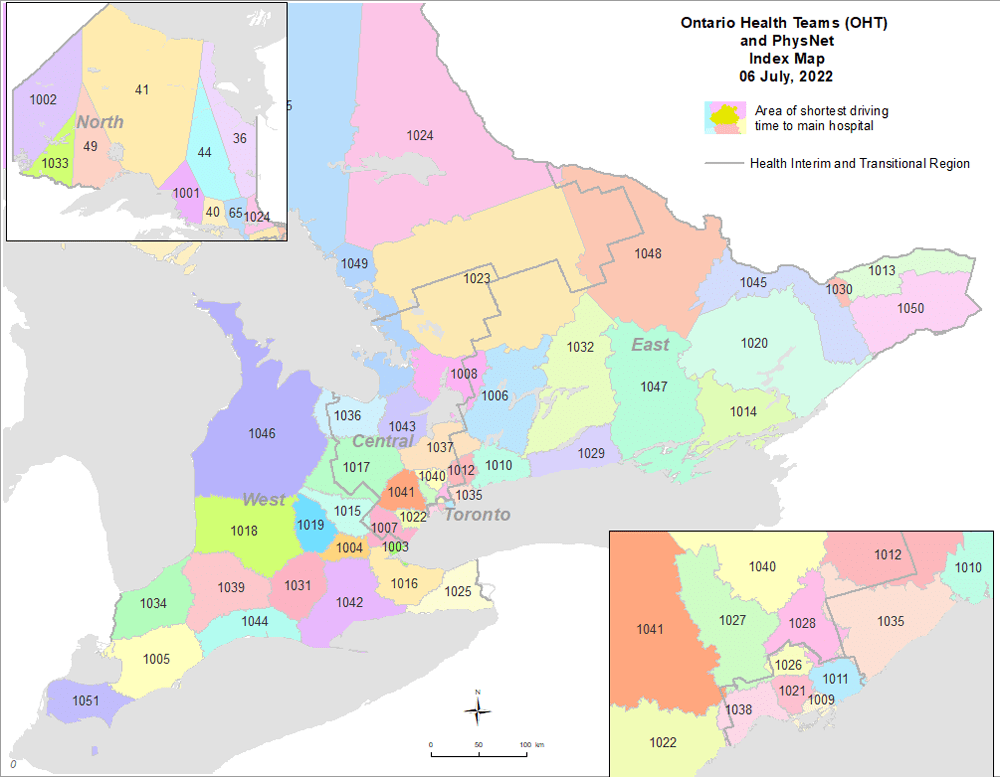New regional health authorities introduced by the provincial Ford government are now in place all around the province.
Ontario Health Teams (OHTs) are groups of health care providers — including hospitals, doctors, home care providers, and community agencies — that operate in a coordinated way to provide a range of health care services. In 2021, OHTs replaced similar organizations, called Local Health Integration Networks (LHINs), that were responsible for the regional administration of provincially-supported public health care.
The news of full provincial coverage comes as the province approves the West Parry Sound OHT, which serves the central Ontario region of Parry Sound, located about 200 km north of Toronto.
One key difference between OHTs and LHINs is that LHINs were autonomous entities that served regional needs, whereas OHTs are more community-based and are overseen by a central provincial agency called Ontario Health. Health care researchers Claire Sethuram, Tess McCutcheon, and Clare Liddy write that the impetus behind the change is to transfer the “bureaucratic load” experienced by LHINs to a central agency, freeing up the local authorities to be “more patient-centered.”
The Ministry of Health calls OHTs “a new way of organizing and delivering care that is more connected to patients in their local communities.”
But Dr. Danyaal Raza, a family physician and an assistant professor at the University of Toronto, has a different take. He believes OHTs and LHINs are “six of one, half a dozen of the other.
“They’re actually different structures that are trying to do the same thing,” he says. At this point in the implementation, at least for Dr. Raza’s work, “[OHTs] haven’t really provided any benefits over what the LHINs were already doing.”
Dr. Raza says it’s been a “long transition” from LHINs to OHTs, and “in some places, it’s taken place and in some places, it’s still happening.” While he recognizes that the recent pandemic makes it “hard to make an assessment” about such a new framework, he believes the success of any regional health system will depend on the support of the government. He thinks observers can look to “how much autonomy the government gives to these local governance models” and “the extent to which primary care is also supported” as indicators of whether OHTs will be effective compared to LHINs.
As for provincial dollars, OHTs will be receiving $2.25 million each over the next three years, according to the Parry Sound North Star, which reported on Ontario’s newest and final OHT being set up in that region.
However, Dr. Raza is hopeful, and believes there are many good people “working very hard to make sure [OHTs] are as successful as they can be.”
While speaking with Excalibur, Dr. Raza also commented on some of the other recent health care changes made by the provincial government, including the decision to allow pharmacists to prescribe certain medications. “Expanding the scope of practice for pharmacists is generally a good thing,” he believes, but it needs to be “done in a way that supports all pharmacists.”
Overall, though, he has “some concerns about some of the things the current government is doing” in terms of the health care system, especially considering rising wait times for elective care and a shortage of family doctors. Dr. Raza advocates for “more investments in team-based primary care.”
Dr. Raza is excited about the expansion of public coverage of certain prescription medications at the federal level — a plan which, when implemented, would cover the cost of diabetes and contraceptive medications. He says this would provide “immediate and quantifiable benefits for patients,” including his own.
“The success of that program will also be driven by the buy-in from provinces. I’m certainly hoping that the Premier and the Minister of Health take advantage of that opportunity,” encourages Dr. Raza.


